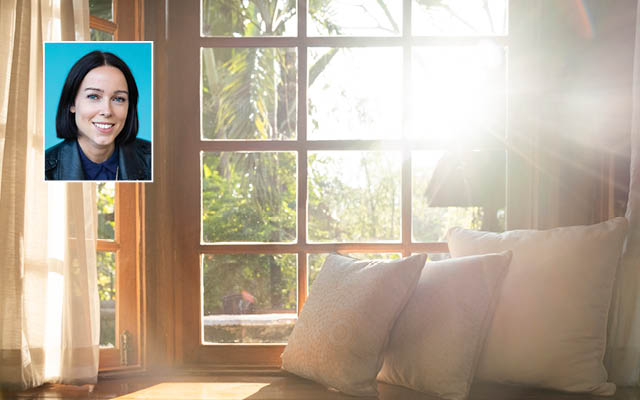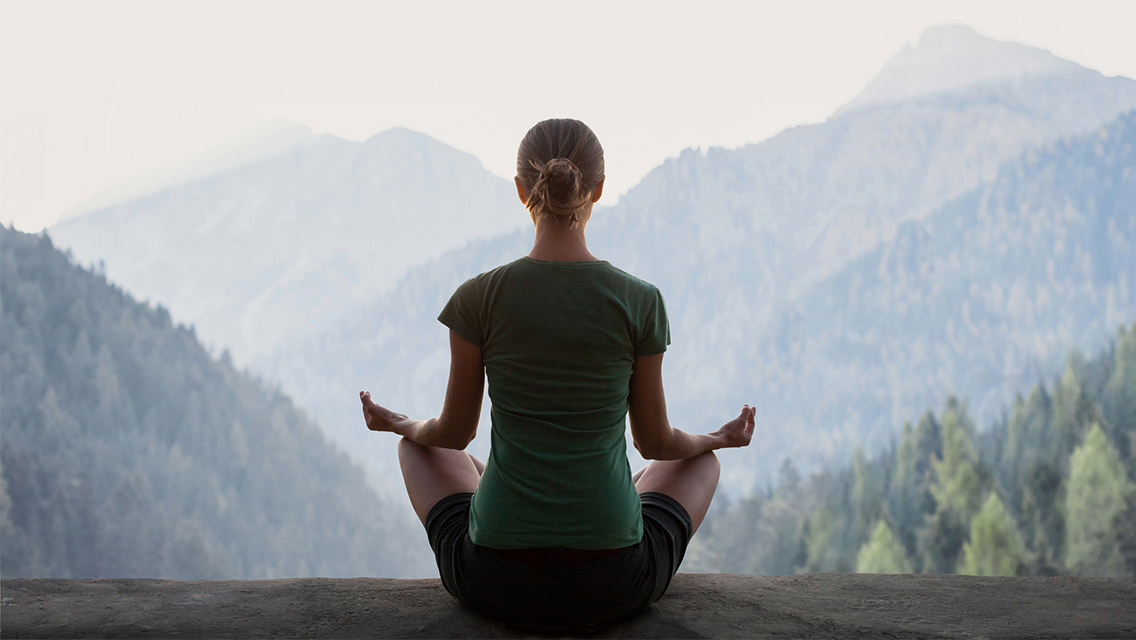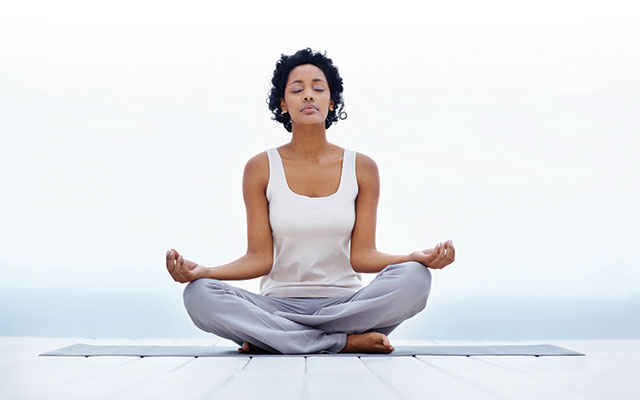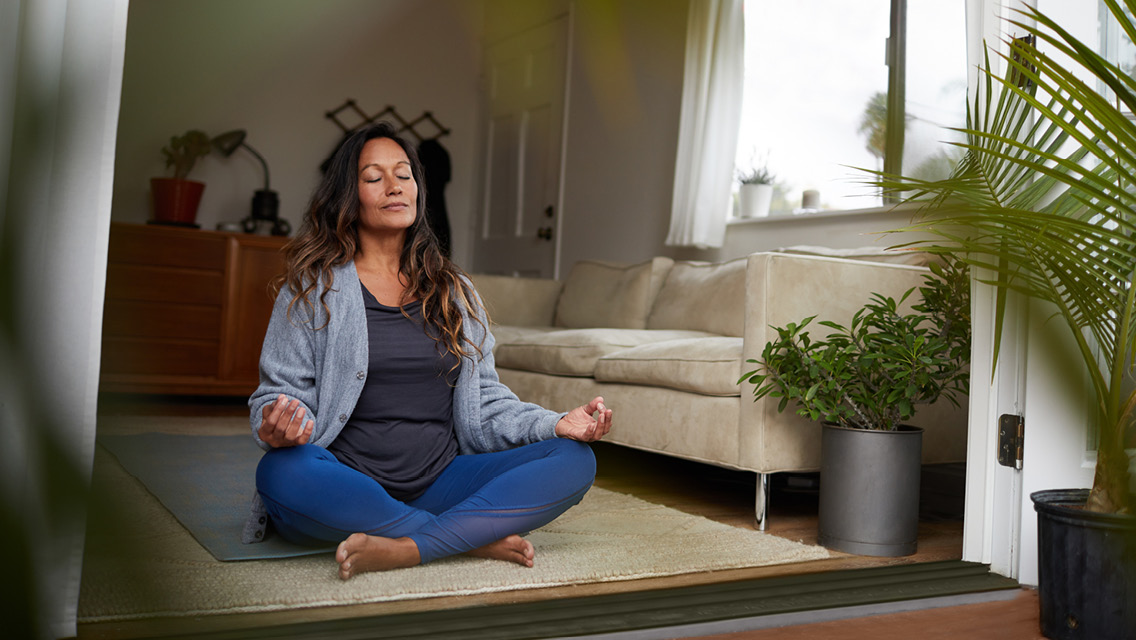Whose voice has eased the most minds since the start of the pandemic (a.k.a. the most super-stressful year)? If you’re one of the 65 million–plus members of Headspace, it’s likely that of Eve Lewis Prieto, the director of meditation and one of the meditation teachers for the popular mindfulness app.
Yet Prieto, with her elegant and inspiring tones, didn’t spring from an enlightened Buddhist ashram. Rather, she grew up working at the family hotel in the west Scottish countryside — and then pursued a career in advertising.
“I was living in London, on the verge of chronic anxiety and stress,” Prieto recalls. “I’d wake up feeling like someone was standing on my chest and my head was physically going to pop. Then a friend recommended meditation.
“I initially thought it was far too spiritual, mystical, not for me. But then I tried Headspace and felt almost instant relief.”
Fast forward a decade and a career change, and Prieto, now based in California, brings relief to others worldwide. “I grew up with all those U.K. ideas — keep a stiff upper lip, carry on as normal, never need help. But I came to understand that meditation is simply about giving the mind some of the same care and attention we give our bodies.”
Care and attention how, exactly? Consider Prieto’s go-to strategies.
Meditate as you are. “You don’t need to wear special clothes, sit cross-legged, or do anything that feels strange or different. There couldn’t be anything more natural than pausing, stopping, and connecting mind and body. So many people are rushing around unaware of that mind–body connection.”
Take meditation breaks. “I put block-breaks on my calendar — essentially fake meetings — so people can’t book over them. If we can find ways to trick the system to manage our day-to-day, we can be happier and more present when we are available.”
Start small — and stick with it. You don’t have to meditate for an hour. “Start with 10 breaths. Then, find two or three minutes. If you can do that every day, that’s better than planning on 20 minutes and not doing it. It’s like lifting weights or running: Doing a little builds up to let you do a little more.”
Create a dedicated space. “I have a specific spot in my living room where I meditate, so I don’t have to think about where to go. I can see outside and settle into that calming, quiet feeling. Pedro, my wiener dog, often lies beside me. He knows not to disturb me — it’s this intuition he has.”
Set phone boundaries. “Imagine waking up and having 10 people around your bed saying things to you — that’s essentially what we’re doing when we open our phones. So, I have a rule that I don’t look at any social media or emails until I’m sitting down to start my workday. And I turn off notifications — that constant buzzing takes us away from what we’re doing in the moment.”
This article originally appeared as “Time to Meditate” in the March 2021 issue of Experience Life.
Peace During the Pandemic
Headspace’s Eve Lewis Prieto offers tips on how to find calm during these uncertain times.
Get OK with not being OK.
“We often have this very critical internal chitchat in the background — I’m a terrible partner, a failure, no good at my job. Unchecked, these emotions can really build up.
“But it’s OK to say to a family member or colleague, ‘I’m struggling, and I need help.’ It can be hard, but right now, when we’re all experiencing a difficult situation, having freedom taken away, being at home. Sharing where you’re really at is a chance to say, ‘I’m not making a fuss, actually. This is hard.’”
Watch for signs of digital exhaustion.
“A lot of people are discovering how exhausting and difficult it is to have your body one place and your mind somewhere else through Zoom meetings. We spend hours in front of our computers, and while we haven’t physically moved, we emerge exhausted. That’s because our mind is racing miles — or months and years — away, and that work is really, truly tiring. Pay attention to that feeling. It is telling you something important.”
Get real about grief.
“I didn’t have a particularly easy start coming to California. Both my husband and I lost our fathers in the first couple of years. If I hadn’t had my practice, I would have moved home.
“Grief is hard to talk about because it’s painful. When we lose someone, there’s a sense that life is no longer the way it was. This is true for all of us during this pandemic — the whole world is grieving because we’ve lost a way of life. Meditation is what has helped me to say: This is part of my life and it has happened. I may not like it, but it happened.”
“When I found out about my dad, I had so many emotions — guilt, anger, an intense pain and sadness. It felt so utterly overwhelming. A big part of meditation mindfulness is considering impermanence. Unfortunately, we’re born, we live, and, at some point, we will die. So how we spend our time with those we love really matters because it won’t always be there.
“The pain I’ve experienced, the pain you’ve experienced, the transition through difficulties, it can all give you compassion for yourself and others. If we can use that for a sense of kindness to ourselves and others, it will hopefully make our lives a more engaging and fruitful experience.”
Look for the lessons.
“The days during the pandemic can be so difficult, but one good thing to remember is that this isn’t going to go on forever. Of course, we still really don’t know the end point, but we do know that we’ll come out of it knowing more about ourselves and having learned more about ourselves and the planet.”




This Post Has 0 Comments